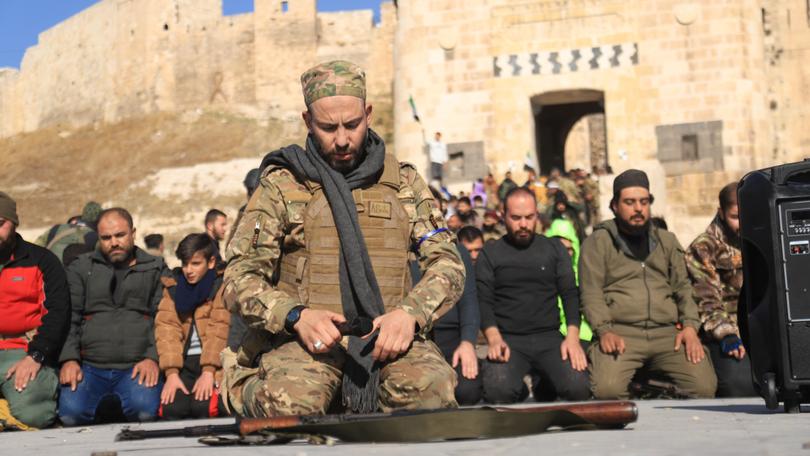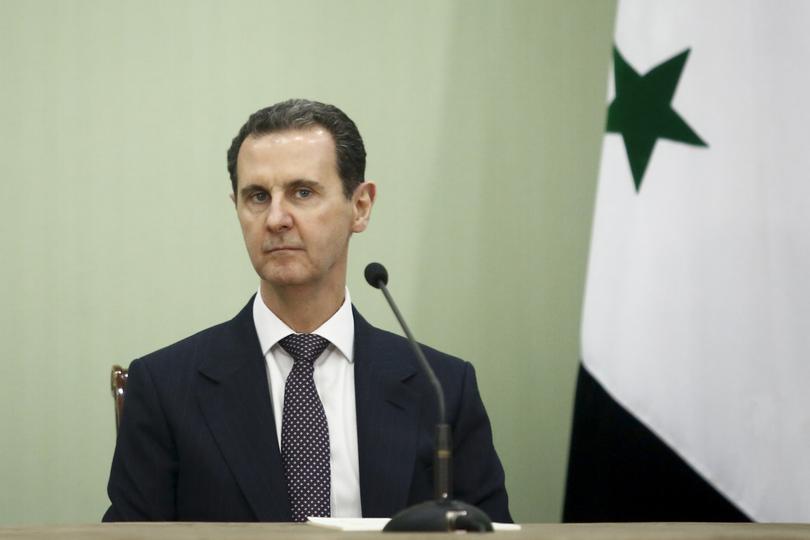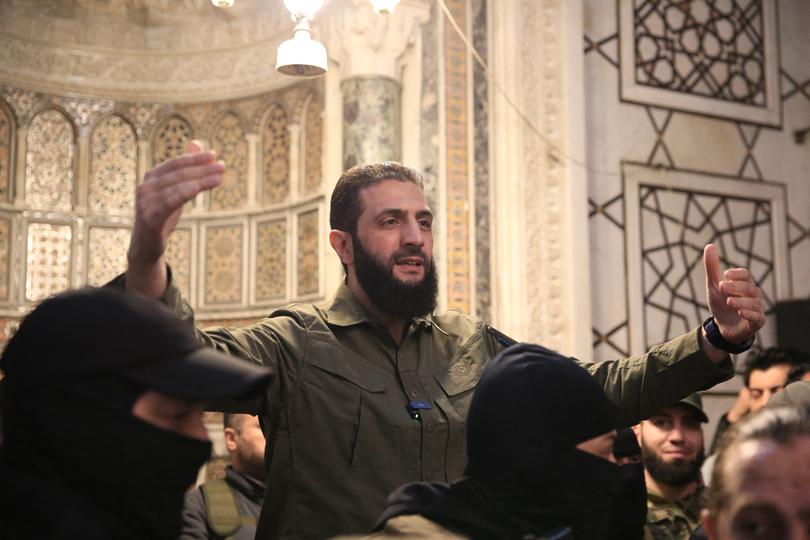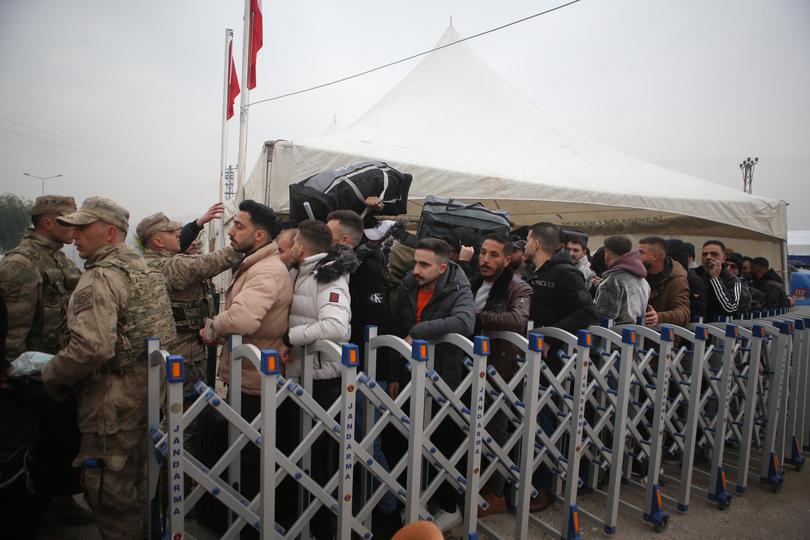LATIKA M BOURKE: Syria poised between ‘promise and peril’ as diplomat John Raine preaches patience
Syria is poised between peace or peril, with the international community worried the Sunni takeover could lead to more conflict.

Expecting the fall of Bashar al-Assad to end in a peaceful Syria is akin to “praying for a miracle”, a leading expert on the Middle East has said.
The warning came as US Secretary of State Antony Blinken landed in neighbouring Jordan and said Syria was poised between peace or peril.
John Raine, who served for more than three decades as a diplomat for the UK in the Middle East, including Syria, Iraq, Saudi Arabia, Kuwait and also Pakistan, and sat on Britain’s national security bodies, said there were a plethora of competing armed community groups in Syria who would not lay down their weapons easily or quickly.
Sign up to The Nightly's newsletters.
Get the first look at the digital newspaper, curated daily stories and breaking headlines delivered to your inbox.
By continuing you agree to our Terms and Privacy Policy.“It’s praying for a miracle that we get through the next stage of Syrian history without those groups at some point coming into conflict,” he said, speaking at The International Institute for Strategic Studies in London where he advises on geopolitical risk.
“The great irony of Syria was that it was a country in which a minority of roughly one per cent of the population was ruling with an iron fist over a country of Kurds, Sunni and other minorities.
“All of whom now feel that rather ironic situation needs to be reversed.
“The great difficulty is that they are all organised into very capable, battle-hardened, non-state groups.
“And I think it will be very difficult for them to lay down their weapons.”
He said it should not be underestimated how many of these different groups existed and that many were aligned with Iran, meaning the HTS coalition could consider them hostile.
“And it may be that they put up some resistance,” Mr Raine said.
He said the main objective for the new government in Syria was the same as in Iraq after the fall of Saddam Hussein — that the multitude of groups must be disarmed.

Mr Raine was speaking at the launch of the IISS annual survey measuring the number of armed conflicts around the world.
The study found the number of armed conflicts had accelerated to their highest number in the survey’s 10-year history – numbering more than 120.
The global outlook for peace was described as “rather bleak” with wars becoming more protracted, intense and deadly in the last year.
US president-elect Donald Trump who campaigned on a “peace through strength” platform has vowed to end the war in Ukraine on day one of his next term, if not before.
And he has warned Hamas militants there will be “hell to pay” if they do not release the hostages captured from Israel in the October 7, 2023 attacks before he is inaugurated on January 20.
Those attacks set off a chain reaction in the Middle East with Israel bombarding the Gaza Strip, taking out Hezbollah’s leadership in Lebanon and successfully attacking Iranian air defence units.
The combined effects of Israel’s military campaigns culminated on the weekend when the Sunni rebel group HTS correctly judged that Assad’s Russian and Iranian backers were too distracted and weakened to defend their puppet and launched their stunning two-week offensive, taking control of the capital Damascus on Sunday.

But the worldwide reaction to the rebels’ success has been muted, with governments worried the Sunni takeover could lead to more conflict. This has so far not happened and HTS’ leader Abu Mohammed al-Jolani, commonly called Jolani, has struck a tolerant tone when speaking to Western media outlets.
Jolani says HTS cut ties with al-Qaeda in 2016 but a $10 million bounty on the head of Jolani issued by the United States remains live.
The US, UK and Australia have brushed aside questions about whether or not to drop their terrorist listing of the Sunni rebel group HTS, once an offshoot of al-Qaeda, that led the weekend rebellion which forced Assad to flee to Moscow where he sought asylum.
When asked by The Nightly what the best approach for governments was to take in response, Mr Raine urged caution.
“Wait,” he said. “This is unbelievably fluid, we don’t really know much about Jolani,” he said.
“There are lessons to be learnt from the Taliban, what did we get right, what did we get wrong?
“It’s really important not to prejudice a position by taking too early a position.”
Russia, which was a naval and airbase in Syria, has been building ties with the Taliban in Afghanistan and is on track to become the first government to recognise the Taliban government, potentially giving it another strategic foothold.
The Taliban first seized control of Afghanistan after the failed Soviet invasion that ended in 1989.
Mr Raine said a major challenge facing governments was deciding what involvement to have in preserving Syria’s territorial integrity.
“I don’t mean by boots on the ground, that’s the last thing we want to do, but in order to assist behind the scenes, diplomatically, whatever, in ensuring that we’re going to unify the Syrian government.”
But he said outside governments could help with the humanitarian challenge posed by refugees returning home to Syria.

After touching down in Jordan, the outgoing US Secretary of State Antony Blinken said it was a moment of “real promise but also peril” for Syria and her neighbours.
“We want to avoid sparking any kinds of additional conflicts inside of Syria at a time when we want to see this transition to an interim government into a better way forward for Syria,” Mr Blinken said.
“And part of that also has to be ensuring that ISIS doesn’t rear its ugly head again.”
